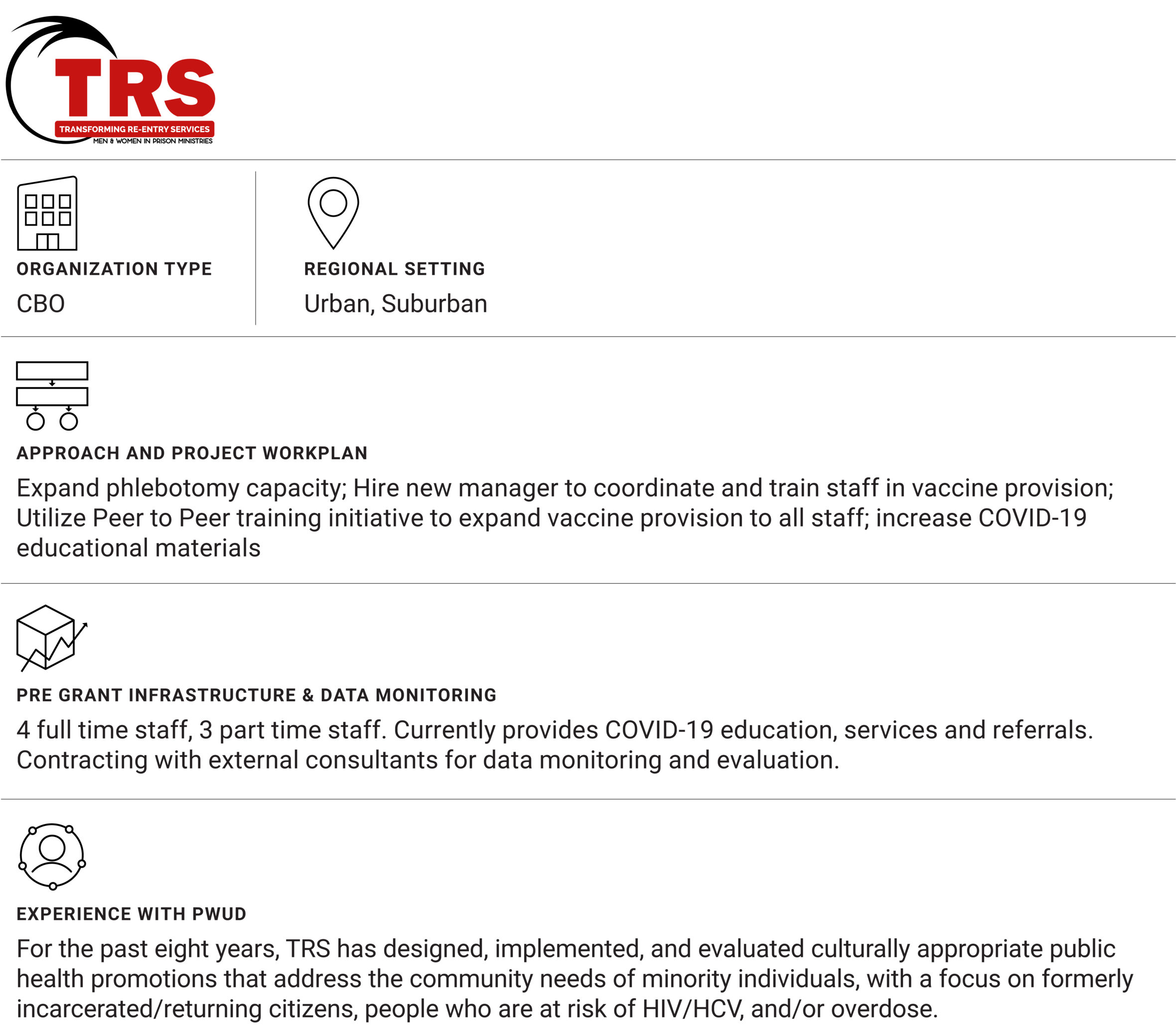
Transforming Reentry Services (TRS)
Overview
Transforming Reentry Services works to create an equitable future for reentry communities. Founded and incorporated by Black women and incarcerated individuals, we combine services, advocacy, and research to fill in the gaps in the system, restore families, and build economic and political power.
Creative Approaches
Use of Illinois Peer to Peer vaccination initiative
To enhance vaccine services and outreach efforts, the organization has increased staffing. This has enabled them to offer vaccines through appointments, walk-ins, and outreach programs. Additionally, they have utilized peer-to-peer vaccination training from Illinois, enabling all staff members to administer COVID-19 vaccines. As a result, their program has expanded significantly, transitioning from appointment-only vaccinations to walk-ins and on-the-spot vaccinations. This has greatly increased their capacity to offer adult vaccinations and has alleviated the barrier that is appointment making and adherence.
Culturally tailored service provision:
TRS prioritized culturally competent service provision by offering vaccines and vaccine education specifically tailored to the communities they serve, which primarily consisted of African American participants. This approach helped address and meet the unique needs and concerns of this community, ensuring that everyone had access to vital healthcare resources.
Expanded reach and additional services:
TRS partnered with the Minority Health Equity Department at the Illinois Department of Health, allowing them to use a mobile health clinic to mobilize vaccine efforts. This partnership helped TRS expand its reach. Additionally, TRS utilized their experience with COVID-19 vaccine provision to respond to a potential Monkeypox outbreak by offering the Monkeypox vaccine. Furthermore, admin and program staff at TRS are constantly leveraging their preexisting personal and professional relationships to further our program's impact and reach. By leveraging said relationships with community organizations, local/state health departments, and other key stakeholders, TRS has been able to expand their services, secure vaccines, and improve overall outreach efforts.
Becoming a funder
Transforming Reentry Services (TRS) has made a significant leap in their journey by becoming funders themselves during the life of our project. They have partnered with Viiv Pharmaceuticals to fund two programs at $20K each, both of which work in reproductive justice and serve Black women in states where abortion is banned. This transformation showcases their dedication to lifting up underrepresented communities and addressing critical issues in the realm of overall health and wellness. It is truly inspiring to see their capacity grow and they continue to be leaders and advocates for change in their communities.
Successes
Opening new location in West side of Chicago
TRS expanded their catchment area to include a new location in the west side of Chicago. In doing so, TRS focused much of their effort to collaborate with local organizations and community leaders to understand the needs and issues of the community, and actively engaged with them to address those concerns. TRS actively participated in local events and supported community initiatives to foster a sense of belonging and demonstrate their commitment to the community. Moreover, they also worked to provide accurate information about COVID-19, its prevention, and the importance of vaccination during said community events and engagement opportunities to help dispel any myths or misinformation. As a part of expanding their efforts, TRS offered educational materials and resources on COVID-19 vaccination, its benefits, and how it can help protect individuals and the community. TRS Continues to actively engage and work with the community to build trust and establish themselves as a reliable and valuable resource in the West side of Chicago.
Improved data collection and analysis processes:
TRS implemented a new REDcap System, which proved to be highly effective in enhancing data collection and reporting methods. As a result, the organization successfully transitioned from solely presenting aggregate data to providing client-level data in their reports, leading to a more comprehensive and insightful understanding of their clients' needs and preferences.
Challenges
Rapport building in new location
As previously mentioned, TRS expanded to a new location on the west side, which called for dedication and effort in understanding and connecting with the community. They faced the difficulty of promoting the program in this new area but overcame it by hiring more staff from the communities they were expanding to and collaborating with reputable local organizations.
COVID-19 and other adult vaccine acquisition
The journey that TRS embarked on to obtain access to COVID-19 vaccines can be described as both lengthy and complex. In the initial stages, like many others across the globe, they faced challenges due to the limited availability of vaccines and the unprecedented demand worldwide. Working closely with the IDPH, TRS navigated through various complex procedures and requirements to gain access to the vaccines. This involved engaging in ongoing discussions, negotiations, and coordination with various stakeholders involved in the vaccine distribution network. TRS had to ensure that they met all the specific criteria set forth by the IDPH to be eligible for vaccine allocation. By forming partnerships with the IDPH, TRS taped into the resources and expertise of the state health department, which likely played a pivotal role in expediting the process. Collaborating with the IDPH not only enabled TRS to gain access to the vaccines but also ensured that the vaccination efforts were aligned with the state's overarching COVID-19 response strategy.
Addressing Vaccine Hesitancy concerns
Vaccine hesitancy among program participants posed a significant challenge that required effective strategies to address and overcome. One of the key obstacles that TRS overcame was the misinformation circulating in society regarding COVID-19 vaccines. Misinformation took many forms, such as false beliefs that COVID-19 has disappeared or that COVID-19 risk was decreased due to changes in mask mandates. With the gradual easing of restrictions in some regions and declining case numbers, some individuals may wrongly assume that the pandemic is over or nearing its end. This misconception led to complacency and a decreased motivation to get vaccinated. Therefore, it was imperative to educate program participants on the continued threat of the virus and the importance of getting vaccinated to prevent the resurgence of cases.
Lessons Learned
Expanding catchment area requires intentionality and partnerships.
Expanding your catchment area is a strategic decision that requires careful planning and deliberate actions. It entails reaching out to new geographical areas and targeting a broader audience. However, successfully expanding your catchment area is not a one-person job; it requires collaboration and partnerships with established agencies and organizations in the new areas you wish to serve. To establish your presence in a new area effectively, it is crucial to collaborate with established agencies and organizations already serving that community. These partnerships can provide valuable insights, resources, and connections that can smoothen the expansion process. Examples of potential partners could include local government bodies, nonprofits, community organizations, healthcare providers, or educational institutions. Building strong relationships with potential partners is crucial for successful expansion. This involves networking, attending community events, and actively engaging with local stakeholders. It is vital to demonstrate to the new area's community and your potential partners that you genuinely care about their needs and are committed to providing valuable services.
Removing barriers around appointment making increases likelihood of vaccine uptake.
Total Monthly Data
|
Service |
Number of Encounters |
|
Received education on COVID and COVID vaccination |
6629 |
|
Referred to COVID vaccination |
697 |
|
COVID-19 Vaccination (on-site) |
412 |
|
COVID-19 Vaccination (off-site) |
166 |
| Monkeypox vaccinations | 0 |
| Other vaccinations | 73 |
| Total encounters | 7145 |

